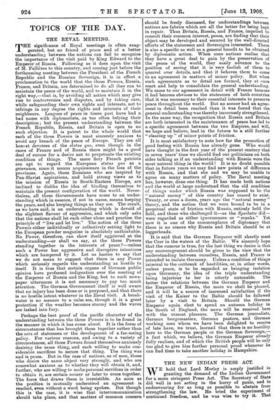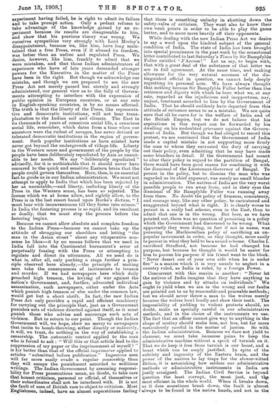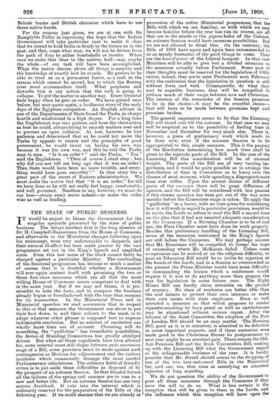THE NEW INDIAN PRESS ACT.
WE hold that Lord Morley is amply justified in granting the demand of the Indian Government for a more stringent Press Act. The Secretary of State did well in not acting in the hurry of panic, and in endeavouring for as long as possible to abstain from strengthening the law. He tried the experiment of continued freedom, and he was wise to try it, That experiment having failed, he is right to admit its failure and to take prompt action. Only a pedant refuses to take advantage of the knowledge gained by an ex- periment because its results are disagreeable to him, and show that his previous theory was wrong. We ourselves sympathise very strongly with Lord Morley's disappointment, because vie, like him, have long main- tained that a free Press, even if it abused its freedom, was better than an unfree and regulated Press. We desire, however, like him, frankly to admit that we were mistaken, and that those Indian administrators of experience who have of late years demanded stronger powers for the Executive in the matter of the Press have been in the right. But though we acknowledge our mistake, and though we are prepared to see the new Press Act not merely passed but sternly and strongly administered, our general view as to the folly of Govern- ments attempting to interfere with the expression of public opinion in European countries, or at any rate in English-speaking countries, is by no means affected. The truth is that the liberty of the Press, like representa- tive and democratic institutions, will not bear trans- plantation to the Indian soil and climate. The East in its thousands of years of conscious social life, a conscious social life, remember, which dates from a time when our ancestors were the rudest of savages, has never devised or tolerated democratic institutions in the region of govern- ment. Such popular institutions as have existed have never got beyond the undergrowth of village life. Liberty in the Western sense and government of the people by the people have been deliberately repudiated by Asia as unsuit- able to her needs. We say " deliberately repudiated " advisedly, for it is unthinkable that it should never have occurred to.the quick and sensitive Eastern brain that the people could govern themselves. Here, then, is an essential fact to guide us in our Indian administration. We must not attempt' to apply to India that which has been rejected by her as unsuitable,—and liberty, including liberty of the Press in the Western sense, has been so rejected. The license which we at home allow, and rightly allow, to the Press is in the last resort based upon Burke's dictum, " must bear with inconveniences till they fester into crimes." In India the festering process is so rapid, and its resultant so deadly, that we must stop the process before the festering begins.
Because we cannot allow absolute and complete freedom to the Indian Press—because we cannot take up the attitude of shrugging our shoulders and letting " the man in the Asian street" shout any vituperative non- sense he likes—it by no means follows that we need in India fall into the Continental bureaucrat's error of perpetually fussing with the Press or attempting to regulate and direct its utterances. All we need do is what is, after all, only pushing a stage further a prin- ciple observed here already,—the principle of making men take the consequences of incitements to treason and murder. If we had newspapers here which daily preached high treason, the levying of war against the nation's Government, and, further, advocated individual assassination, such newspapers, either under the Acts' which punish high treason or else under the common law, would get but a short shrift. In fact, the new Indian Press Act only provides a rapid and efficient machinery for carrying out the principle that, just as a Government punishes acts of violence directed against itself, so it must punish those who advise and encourage such acts of violence. But to return to our point. Though the Indian Government will, we hope, show no mercy to newspapers that incite to bomb-throwing, either directly or indirectly, it.will, we trust, do nothing in the way of establishing a censorship. The automatic control applied to the man who is forced to ask : " Will this or that article lead to the suppression of my paper or the imprisonment of myself ? " is far better than that of the official imprimatur applied to articles " submitted before publication." Ingenious men will far more easily evade a regular censorship than they will escape the punishment accorded to seditious writings. The Indian Government by assuming responsi- bility for Press prosecutions mean, no doubt, to take care that honest criticism, personal or official, of themselves or their subordinates shall not be interfered with. It is not the fault of men of British race to object to criticism. Most Englishmen indeed, have an almost superstitious feeling that there is something unlucky in shutting down the safety-valve of criticism. They want also to know their own weak points in order to be able to play the game better, and to score more heavily off their opponents.
While dealing with the new Indian Press Act we desire to say a word upon the kindred subject of the general condition of India. The state of India has been brought into special prominence in the past week by the sensational letter contributed to last Saturday's Times by Sir Bampfylde Fuller entitled "J'Accuse I" Let us say, to begin with, that with a great deal of the substance of that letter we are in full agreement. At the same time, and making allowance for the very natural soreness of the dis- tinguished official in question, we cannot help deeply regretting its personal note. We have always thought that nothine. became Sir Bampfylde Fuller better than the reticence and dignity with which he bore what we, at any rate, regarded as the injudicious and inopportune, nay, unjust, treatment accorded to him by the Government of India. That he should suddenly have departed from this attitude of reticence seems to us a mistake. We are quite sure that all he cares for is the welfare of India and of the British Empire, but we do not believe that his aspirations in this respect can be forwarded by his dwelling on his undoubted grievance against the Govern- ment of India. But though we feel obliged to record this protest, we are convinced that the Government of India made a capital mistake in not supporting more firmly the man to whom they entrusted the duty of carrying out their policy, even admitting that he may have made some blunders in detail. If the Government had meant to alter their policy in regard to the partition of Bengal, there would have been good reason for combining it with the dismissal of the Lieutenant-Governor of Bengal. To persist in the policy, but to dismiss the man who was regarded as its chief exponent, was surely no small blunder in administration. The natives of India are the very worst possible people to run away from, and in their eyes the dismissal of Sir Bampfylde Fuller was running away from them. No doubt the policy of firmness, consistency, and courage may, like any other policy, be caricatured and exaggerated beyond what is right. It is clearly worse to persist in a really bad scheme, even in the East, than to admit that one is in the wrong. But here, as we have pointed out, there was no question of persisting in a policy which the Government had discovered to be wrong. What apparently they were doing, in fact if not in name, was pursuing the Machiavellian policy of sacrificing an un- popular instrument in order, as they thought, more easily to persist in what they held to be a sound scheme. Charles I. sacrificed Strafford, not because he had changed his purpose, but because he thought it would be easier' for him to pursue his purpose if his friend went to the block. "Never desert one of your own side when he is under fire" is a maxim which it is very unsafe to neglect in a, country ruled, as India is ruled, by a foreign Power.
Concurrent with this maxim is another : " Never let the natives of India imagine that they have anything to gain by violence and by attacks on individuals." We ought to yield when we are in the wrong and our faults are pointed out to us by reasonable and peaceable methods; but we should never throw a man to the wolves merely because the wolves howl loudly and show their teeth. The impossibility of yielding to violent protests should, no doubt, make us specially careful in our administrative methods, and in the choice of the instruments we use. The fact that an officer cannot give way to anything in the shape of mutiny should make him, not less, but far more meticulously careful iu the matter of justice. So with the Indian administration. Because we dare not yield to clamour, we must take immense pains to keep the administrative machine without a speck of tarnish on it. That we do keep it free from tarnish is our boast, and a boast which can be amply justified. In site of the subtlety and ingenuity of the Eastern brain, and the power of the natives to lay traps for the slower-witted Briton, it is astonishing how seldom our administrative methods or administrative instruments in India are justly arraigned. The Indian Civil Service is beyond question the least corrupt, the most just, and dip most efficient in the whole world. When it breaks down, as it does sometimes break down, the fault is almost' always to be found in the native hands, and not in the British brains and British character which have to use those native hands.
For the reasons just given, we are at one with Sir Bampfylde Fuller in expressing the hope that the Indian Government will take particular care to make it clear that we intend to hold India as firmly in the future as in the past, and that, come what may, we will not be driven from the path of duty by either bombshells or insults. When once we make that clear to the natives, half—nay, maybe the whole—of our task will have been accomplished. What the native desires above all things is security and the knowledge of exactly how he stands. He prefers to be able to treat us as a permanent factor, as'a rock in the stream which cannot be moved, but to which the flowing river must accommodate itself. What perplexes and disturbs him is any notion that the rock is going to collapse. To put the matter in another way. Every Oriental feels happy when he gets an order. We have quoted once before, but may quote again, a luciferous story of the early days of the Egyptian occupation. An English adviser in one of the Departments of State found the Pasha in charge hostile and recalcitrant in a high degree. For a long time the Englishman was very patient, and bore the obstruction as best he could, always trying to smooth matters over and to prevent an open collision. At last, however, he lost patience, and determined that as he could not move the Pasha by appeals to reason and the principles of good government, he would insist on having his own way because it was his own way, and this he told the Pasha man to man. " Is it an order ? " said the Pasha. " Yes," said the Englishman. " Then of course I shall obey ; but why did you not tell me long ago that it was an order ? Then there would have been no more trouble, and every- thing would have gone smoothly ! " In that story lies a great part of the secret of Eastern administration. We must make the native feel that " it is an order," for till we have done so he will not really feel happy, comfortable, and well governed. Needless to say, however, we must do our best—strain every nerve indeed—to make the order wise as well as binding.








































 Previous page
Previous page